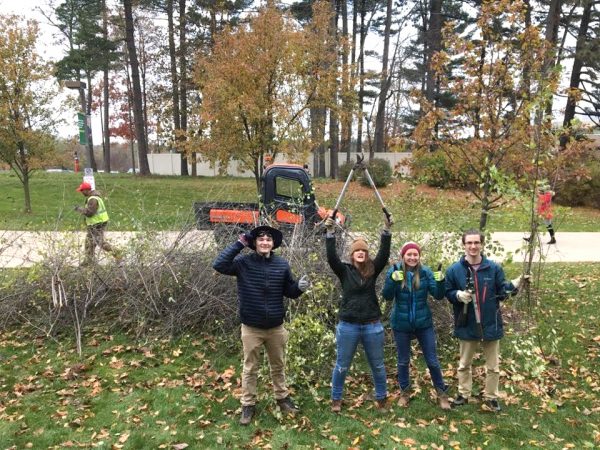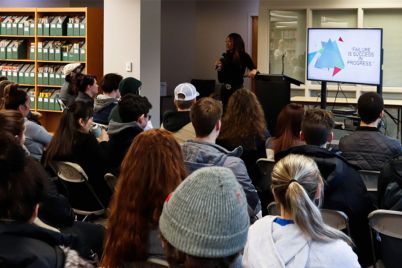
Students for Sustainability president Alex Pufahl (left) pictured with club members and WCC students removing invasive species from campus last semester. Courtesy of Theodore Bohdanowycz
By Danny Villalobos
Staff Writer
The Students for Sustainability club at WCC plans to create an edible food garden on campus.
There were many ideas that floated around the club, the first being a butterfly garden on campus.
“That was the initial idea,” said Alex Pufahl, president of Students for Sustainability, which aims to raise environmental awareness in the Ann Arbor and Ypsilanti area. “It was a cool idea to get people to integrate with nature.”
The idea for a butterfly garden was later scrapped when a walk through Buhr Park Food Forest with club advisor and environmental science teacher Emily Thompson helped plant the seed of inspiration for an edible food garden.
“The idea hasn’t gotten off of the ground yet, it’s still very much in development,” said Theodore Bohdanowycz, a club member.
The reason for scrapping the butterfly garden came down to an issue of upkeep, according to Pufahl.
“We are a club that have different varying schedules, and we don’t know the amount of people that will be in the club after we leave,” said Pufahl. “The edible food garden would require less upkeep and we believe that after we’re gone, it’ll leave a stronger sustainability culture on campus.”
“What stuck us together for this project is trying to integrate the urban side of campus with the natural side of campus,” Bohdanowycz added.
Mixing order and disorder to show the order of the food forest, while trying to maintain the native look, would require less upkeep—the opposite of a butterfly garden.
“Realistically, it’ll kick things off during this fall semester,” Bohdanowycz said. “The project may take half of the semester to implement and the forest development will be three to five years.”
They plan to model their garden after their own ideas instead of following exactly what they saw in Buhr Park, according to Pufahl.
“Don’t get us mixed up, we love what Buhr Park is doing, we just think we have something else that we can do,” said Pufahl.
“We want to make something that actually looks like a forest, not something that’s broken up and separated,” said Bohdanowycz.
Recently, the club spotted a plot of land in which to put their garden. The land is next to the campus daycare.
“I have given Alex and Theo preliminary approval from the landscape and grounds department to explore their project of installing a food forest,” said Holly Herman, the landscape and grounds maintenance manager.
According to Herman, although the club has her approval to install the garden, the final decision comes down to executive leadership. Furthermore, there are yet more documents needed before a go-ahead is given.
“We are excited to support initiatives that focus on education and create unique landscape environments,” said Herman.
The club have plans to work with Tree Campus USA, who will provide them with the plants needed for their project.
Tree Campus USA is a program that recognizes schools across the country who effectively take care of their trees. WCC is recognized by Tree Campus USA for its efforts in meeting the requirements needed to be a part of the program for a third consecutive year.
Requirements to join the program include maintaining a tree advisory committee, a campus tree-care plan, dedicated annual expenditures for its campus tree program, an Arbor Day observance and a student service-learning project.
Despite the current development stage of the project, they’ve made sufficient progress thus far. Bohdanowycz is currently working on how the garden will function, carefully choosing which plants will be picked for each layer and how they will either work or compete with each other.
“We have to be careful when choose our plants for the garden,” said Bohdanowycz. “We don’t want bring in plants that are not native to Michigan.”
The club is also figuring out how they’ll present their project to the board of trustees.
“This also has to fit somewhere in the curriculum as well,” said Emily Thompson. “Perhaps the culinary program can benefit from this garden.”


